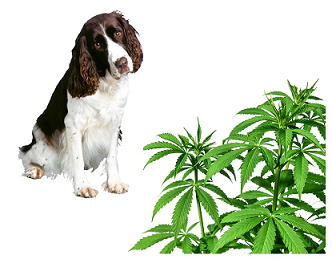
Did you know?
Cannabis is
still illegal for use in veterinary medicine in California.
California Veterinary Medical Board - Guidelines for Veterinarians
Discussing
Cannabis with Pet Owners, Effective January 1, 2020
Federal law
prohibits veterinarians from possessing, administering,
dispensing, or prescribing cannabis and related products.
Although California state laws legalized cannabis use for
adults over 21 years of age, and physicians may prescribe
marijuana for human patients, California law still does not
allow veterinarians to prescribe cannabis for animals.
What is Cannabis?
The term “cannabis”
includes marijuana and hemp products. “Marijuana” refers to
all parts of the Cannabis plant, including the flowering
portion, leaves, seeds, extracted resin, and any products
derived from these parts. Marijuana often contains high
levels of compounds called cannabinoids. The two main
cannabinoids are tetrahydrocannabinols (THC) and
cannabidiols (CBD). THC is a psychoactive compound that
affects brain function and is what gives you the “high”.
Recreational marijuana often contains high levels of THC.
CBD is a non-psychoactive compound and is found in higher
levels in medical marijuana. Cannabis products come in a
variety of forms, including edible products (e.g. candy,
cookies), plant products (e.g. leaves, cigarettes), and
oil/butter.
Is cannabis safe for
pets?
Products marketed for pets often report
they are made from hemp and may be labeled as “cannabis”
rather than “marijuana”. There is very little research on
the effects of cannabis on pets for safety, appropriate
dosage, and effectiveness. There is currently no way to
guarantee the purity of the ingredients in cannabis
products, as there is no government organization overseeing
the quality control of these products. Although cannabis pet
products may claim to have health benefits for your pet,
this claim has not been tested or verified by the Food and
Drug Administration (FDA). It is important to note also that
hemp is not approved by the FDA for use as an ingredient in
animal food, products or pharmaceuticals.
Dogs and cats may be more sensitive to the effects of
cannabis than people, and even small amounts can be enough
for pets to develop possibly life-threatening toxicity. Pets
commonly develop toxicity from ingestion of cannabis or
cannabis products, but secondhand smoke inhalation can also
be harmful. THC can change how the liver works. Because the
liver plays an important role in processing food and
medications, THC exposure may alter the effects of other
important medications or supplements pets are taking.
Can a veterinarian
prescribe cannabis or cannabis products for my pet?
No. In the
United States, it is illegal for veterinarians to prescribe
cannabis or cannabis products to pets. Federal law
prohibits veterinarians from possessing, administering,
dispensing, or prescribing cannabis and related products.
Veterinarians who are prescribing cannabis products for pets
are also in violation of California state law. While
California Proposition 64 legalized cannabis use for
individuals 21 or older, there is no legislation allowing
individuals to give cannabis products to pets. Federal law
still considers marijuana a Schedule 1 controlled substance,
meaning it is illegal, has a high potential for abuse, and
has no currently accepted medical use in the United States,
for humans or animals.
On September 27, 2018, California Legislature Assembly Bill
2215 (AB-2215), regarding cannabis, veterinarians and
animals, was approved by the governor. This bill allows
veterinarians to discuss medicinal cannabis use in animals
with pet owners, however it is still illegal for
veterinarians to prescribe cannabis for pets.
What are the signs of cannabis
toxicosis in pets?
The most common signs of cannabis
toxicosis include: lack of balance and coordination,
disorientation, slow heart rate, dilated pupils, sensitivity
to light and sound, and dribbling urine. Other signs of
cannabis toxicity may include: excessive drooling, seizures,
vomiting, and lethargy.
If your pet ingested cannabis or cannabis products,
or if your pet is showing signs of cannabis toxicosis,
contact your veterinarian right away. In situations
of cannabis toxicity, it is important to take your pet to a
veterinary hospital immediately. Please be honest with your
veterinarian about what cannabis products your pet has been
exposed to or has ingested. Failure to do so can make it
difficult to correctly diagnose your pet and will delay
appropriate treatment.
Reporting cannabis toxicosis in pets
Veterinarians and pet owners in Los
Angeles County are now able to report cases of cannabis
toxicity to the Veterinary Pubic Health program. Our
reporting forms are designed to keep the reporter and the
pet owner anonymous, so any personal information will not be
required. We encourage reporting cases of cannabis toxicity
to help our program collect information on cannabis products
that are causing poisoning in pets, and potentially identify
what amounts of cannabis may be dangerous for pets.
How to report?
Two ways:
-
Veterinarians can
download and print the cannabis toxicosis
reporting form (pdf). Completed
forms can be returned to VPH by email to
vet@ph.lacounty.gov or by FAX at (213)
481-2375.
-
Online reporting
for veterinarians and pet owners.
See the two links below. You will be asked
to fill out a form on a secure website. You
may be prompted by your computer to accept a
security alert when you access the form.
Click “Yes” to proceed.
Reporting form for
veterinarians 
Reporting Link the Public
If you have additional questions about
reporting cannabis toxicosis in pets in Los Angeles County,
please call our office at (213) 288-7060.
Resources
for Pet Owners
Resources for
Veterinarians
Additional
Information on Human Cannabis Use in California
Los Angeles County Department of Public Heath -Cannabis
webpage
California Department of Public Health - Cannabis webpage
Last updated: November 18, 2019